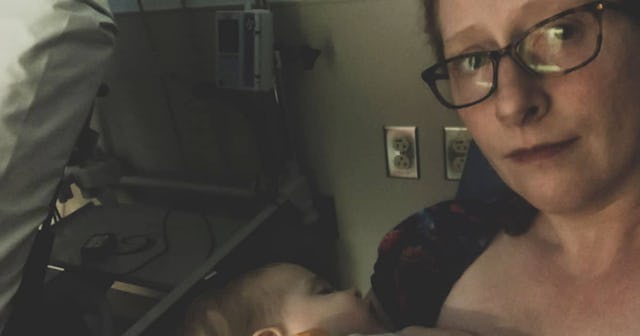A 911 Dispatcher Changed Me As A Parent -- And As A Person

Mere days ago, as I held my 19-month-old son in my arms, I truly thought I was watching him die.
It started in the evening at a friend’s lake party. My husband handed off the baby while we were helping our other children get hot dogs and potato salad. “He’s warm,” I said.
“It’s a warm night.”
True. But within 20 minutes his warmth was undoubtedly a fever. We left early, returned home to administer ibuprofen and tuck him into bed. He was warm, but not alarmingly so. After six children, my lips know a fever as well as any thermometer.
He slept through the night and through the pre-dawn hours as I sent my husband and two older children to drop one off at high school orientation. “I’ll pick up Tylenol on the way home,” my husband said. And our morning went as usual, baby stirring, me picking him up and nursing in the rocking chair.
My mama-lips sensed trouble, heat. I unsnapped his thin summer pajamas, and stopped nursing to rustle through a basket by the changing table for the thermometer. Underarm temp was 101.8, which I knew was several degrees below his “actual” temp. 102, 103, 104. None of those numbers were good.
“Let’s get you some meds,” I told him. He nursed, sucked down cool water, took ibuprofen, but all other attempts at his usual morning routine were rejected. So by 7:45 I was headed back upstairs. More nursing, more sleep, that’s what baby needs. I forgot about my urge to check his “real” temperature and sat again in the rocking chair.
He didn’t want to nurse, so I put him to my shoulder to rock, and he began to gag—sounds usually accompanied by regurgitated milk and frothy water. I pulled him quickly back, calling the only other person up at the time, his 7-year-old sister. His pajamas were dry and hot.
And something wasn’t right. He was staring at something far above us, arms curled oddly, shaking. Just then my daughter flicked on the overhead light.
It’s odd what the brain thinks during trauma. This isn’t an emergency, it told me, your husband won’t even believe what you’re describing. You know what this is, it will be over in a second, and you’re in your nightgown, for heaven’s sake.
I sent my daughter to wake her teen brother and tried to call my husband. No answer. And for seconds, eternal seconds, I watched my son, and my sluggish brain realized this very much was an emergency and nightgown or not, I needed—he needed—help.
Courtesy of Rebecca Grabill
As my son’s lips turned blue, then purple, I screamed at Siri to dial 911, and when she ignored me (I hadn’t programmed my “Hey Siri” to respond to panic), I fought through my own tangled thoughts to place the call, forgetting even to hold the phone to my ear until I realized I couldn’t hear if the call was going through.
“My son,” someone said with my voice, not me, someone else. “My son is having … just had a seizure.”
In my arms, my son gasped, his breath crackling. He gasped again, his body trembling. The deep purple of his lips lightened, pinked.
“Every time he inhales, say the word ‘now’,” the dispatcher instructed, slowly, as if I were a very young child.
My brain took its time understanding him. My son’s breaths were so crackly, the inhales and exhales sounded the same. Finally I focused on his chest, the puckering and expansion of his ribs. “Now … now.”
My brain begged for his next breath. Now. It told me crying would not help anything. Now. It reminded me an ambulance would be screaming up the drive. Now. And I’m in my nightgown. Now. But he’s alive, his breaths quieter, more regular. Now.
“Good, you can stop. Sounds like his breathing is okay.”
They told me someone would be there soon, told me to unlock the door, to turn the lights on. My oldest son came in, his dad on the phone. I got dressed, packed the diaper bag, waited with my child who was either unconscious or exhausted and sleeping — I still don’t know which.
gorodenkoff/Getty
We didn’t need the ambulance. Febrile seizures aren’t usually serious. We could drive him to the hospital ourselves. We did drive ourselves there, twice in one day.
I could write at length about hospitals, about a flawed and profit-driven medical system. I could write about young residents so fresh they can’t decide, when a mother yells, tears streaming and baby screaming, whether to be offended or alarmed. But those things are all distractions. Those things ultimately don’t matter.
Blog schedules, school books, emails I reply to robotically, they don’t matter.
Because, now.
Now, I can’t stop looking at him, touching his cheek, studying the softness of his lashes and his fluffs of hair that never quite lay flat.
Now, I can’t stop the terror that existed outside me, hovering, surrounding me, terror I didn’t feel at the time. I saw it in my mind and studied it with distanced curiosity.
Now, I can’t stop the thoughts I wouldn’t allow then: long hospital stays, endless tests, dim prognoses, an empty crib—the realities of so many others, that thanks be to God are not my own.
Now, I am grateful. Raisins on the floor, chubby hand yanking my hair, sharp little teeth while he’s nursing, all the books pulled off the shelf. Again. And again. And—wonderfully, joyfully—again.
Now he’s waking from a nap, his small form wriggling in the video monitor’s screen. And I’m rising, leaving my to-do list, my thoughts, my terror, to be with him. Because the only time to experience now is …
Now.
This article was originally published on